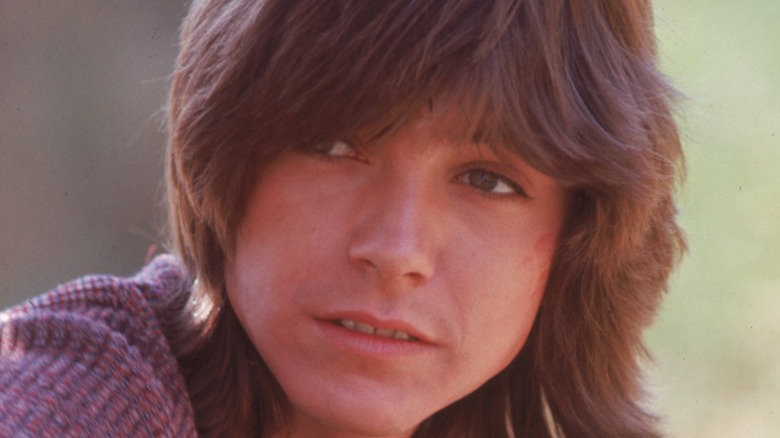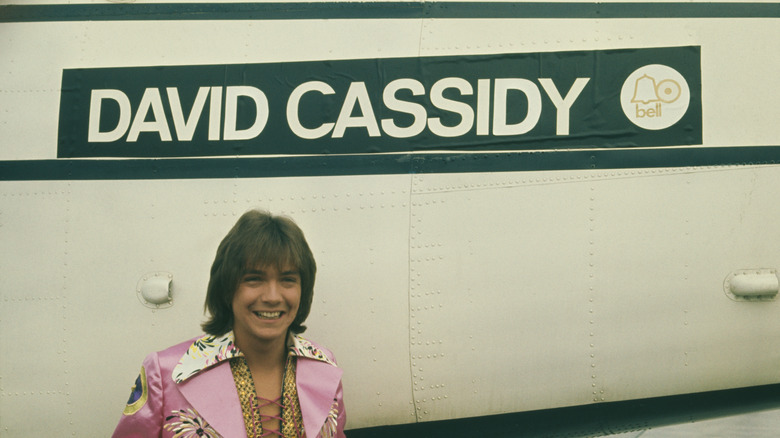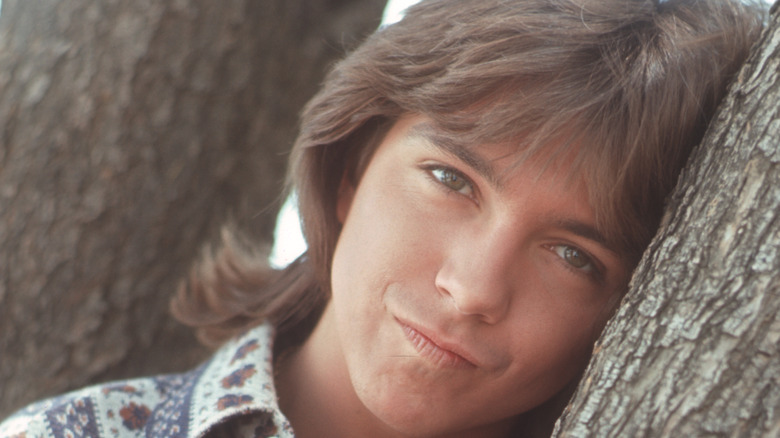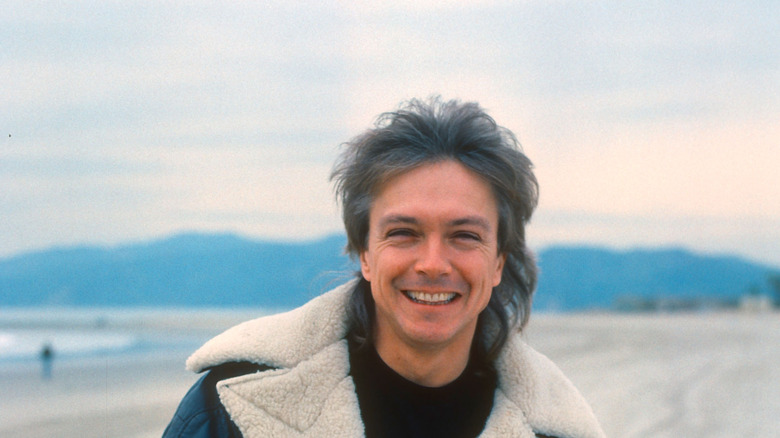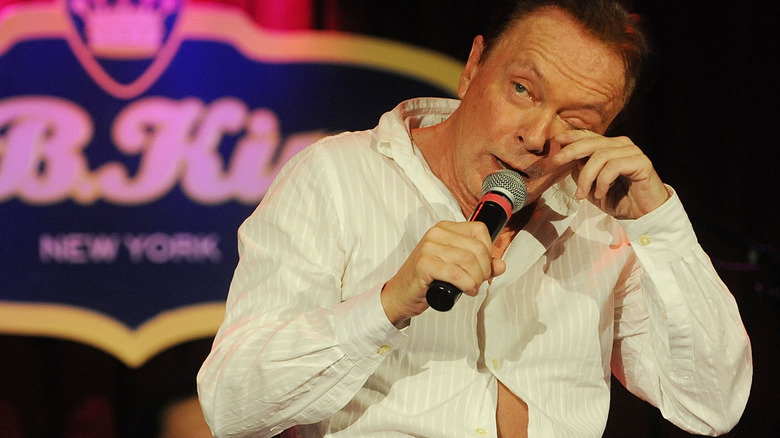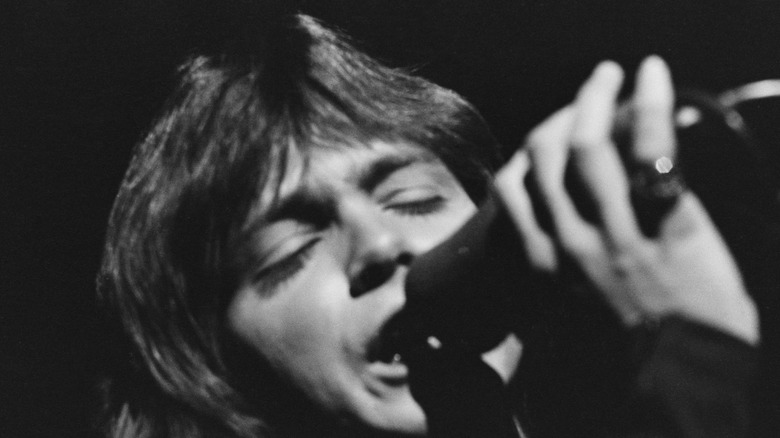Why David Cassidy Filed For Bankruptcy
Born on April 12, 1950, teen idol David Cassidy ruled the radio and TV airwaves in the early 1970s as the hunky heartthrob Keith Partridge on "The Patridge Family." Born the son of an actor and actress, show business was in Cassidy's DNA. His stepmother Shirley Jones played his TV mom Shirley Partridge on the program and, along with Cassidy, were the only cast members who sang. Thanks to mega-hits, including "I Think I Love You" and "I Can Her Your Heartbeat," David Cassidy enthralled young girls with his husky voice, groovy shag haircut, and angelic face.
As the show grew in popularity, Cassidy found it difficult to go anywhere without being followed by crowds of admiring fans. Cassidy mentions in his memoir, "C'mon, Get Happy: Fear and Loathing on the Partridge Family Bus," that seeing himself gracing the covers of teen magazines was a trip. He wrote, "At first it was kind of a kick to see myself on a magazine cover. And, of course, I answered all their questions: Where did I live? Where did I shop? And on and on."
Partridge-Era Money Issues
David Cassidy continued to enjoy global popularity thanks to "The Partridge Family," but cash flow issues were already plaguing him. Cassidy maintained that Sony Pictures Television made $500 million from "Partridge Family" merchandise. Meanwhile, he only received $15,000 of that sum. As Cassidy told Yahoo, "[T]hey can make anything they want. David Cassidy guitars, lunchboxes, magazines, pillowcases, dresses, Colorforms, books — anything they could sell to kids." The actor was livid and renegotiated with Sony to own a piece of "The Partridge Family." Cassidy was very proud of himself for facing the studio and prevailing, and he was one of the few entertainers ever to do so.
Cassidy was also becoming uncomfortable with the constant attention from the teen mags. He even approached Chuck Laufer, who was in charge of many of the mags he took issue with. Cassidy suggested that Laufer print more articles about other teen idols, and Laufer laughed in his face and informed the actor that the publicity wasn't for his benefit. Laufer informed Cassidy that the mags paid a lot of money for the marketing rights to his name — they deliberately created a frenzy around Cassidy because it made them big bucks to do so. Cassidy claims he never saw a penny from this.
David Cassidy — Human Commodity
David Cassidy had been considering leaving "The Patridge Family" long before he actually did. He was worried about being typecast as Keith Partridge, and rightly so. Cassidy told Goldmine he believed the bubble he lived in because of his fame created "a certain immaturity and even though I was 24 ... I was about 19 emotionally. I hadn't lived; I'd devoted myself to the business of David Cassidy, rather than the person." So in 1974, Cassidy decided to retire after a last series of concerts. His fans went bonkers, and the gigs sold out weeks before the shows. One of the stops on tour was the enormous White City venue in London. On the day of the show, the area around White City was swarming with fans, those looking for tickets, and scalpers more than happy to provide tickets at many times the face value.
During the show, David Cassidy super-fan Bernadette Whelan was crushed to death under the weight of thousands trying to get closer to the stage (a crowd surge). Cassidy wasn't fully aware of the carnage in his audience and continued to finish the show. When he found out the truth, Cassidy didn't want to play any of the upcoming gigs, but his management persuaded him to reconsider. Bernadette Whelan, age 14, died two days after the show. Grieving, in shock, and completely disillusioned, Cassidy resolutely withdrew from the spotlight.
Mo' Money, Mo' Problems
David Cassidy wasn't raking on the big bucks like most assumed, considering his epic popularity. He only earned $600 a week from "The Partridge Family." From that sum, Cassidy also had to pay his manager and his agents, and he received no advances or royalties from the hit records he sang on. When he left the show, he planned to record and perform the kind of music he enjoyed — hard rock. He was happy to leave the bubblegum music behind him, but before long, the fame that followed him began to dwindle as the 1970s progressed.
Cassidy's career began nosediving in the 1980s. He only released two albums during that decade, and he mainly stuck to acting roles. By 2015, he had settled in Florida, where he filed for bankruptcy, an amazing turn of events considering he sold over 25 million records during the peak of his career. He had to sell his Fort Lauderdale house, which was a tremendous financial and personal blow as Cassidy considered the home his refuge. Alcohol and marital problems compounded his economic instability — he developed a serious drinking problem and accrued several DUIs. Frustrated with Cassidy's drinking, his wife Sue Shifrin Cassidy filed for divorce in 2015. He sank even lower personally and professionally, and his health began to suffer.
Cassidy Reveals He Has Dementia
After David Cassidy was arrested three times for drunk driving and completed a court-ordered rehab stint, he was forced to file for Chapter 11 bankruptcy in 2015, which included selling his beloved Florida home. He blamed his dire financial situation on bad investments and his inability to go out on tour, which was always his most lucrative option for fast cash. With an average monthly income of $12,500 but expenses that exceeded $27,772, it was clear Cassidy was sinking fast, not just financially but personally. He'd lost his home, his wife, and the last vestiges of his career.
Then, in 2017, David told People that he was experiencing dementia. His grandfather and mother also had dementia, and Cassidy always felt he'd meet the same fate. When his fears materialized, Cassidy decided to retire from show business. He planned to look after his health, spend time with family and friends, and enjoy the quality of life he had while he still could. Unfortunately, he had far less time than he thought.
David's Will
When David Cassidy died at 67 in 2017 of alcohol-induced liver failure, his legions of still devoted fans were heartbroken over his early and sad demise. In his will, he left his inheritance to his son Beau while excluding his daughter Katie entirely (via People). Cassidy left more assets than expected, considering his propensity for poor money management — Beau received $450,000 from a retirement plan and a life insurance policy worth 1 million. Meanwhile, his daughter Katie, whose relationship with her dad had its up and downs, apparently had no hard feelings about being excluded from Cassidy's will as she was by her father's side when he died.
Ad he grew closer to death, Cassidy denied having any money problems, and Beau's inheritance seems to bear this out. "The financial part is not an issue," Cassidy told People. He was more preoccupied with his dwindling mental capacity, which could've resulted from his decades of drinking rather than a genetic condition. After Cassidy passed away, his daughter Katie took to Twitter. She said (via OverSixty), "Words can't express the solace our family's received from all the love & support during this trying time. My father's last words were 'So much wasted time.'"
JoAnn Geffen, David's long-time rep, told The Hollywood Reporter, "David died surrounded by those he loved, with joy in his heart and free from the pain that had gripped him for so long. Thank you for the abundance and support you have shown him these many years."
If you or anyone you know is struggling with addiction issues, help is available. Visit the Substance Abuse and Mental Health Services Administration website or contact SAMHSA's National Helpline at 1-800-662-HELP (4357).
